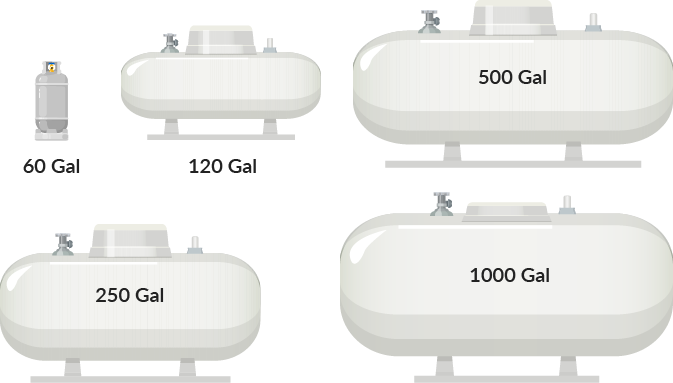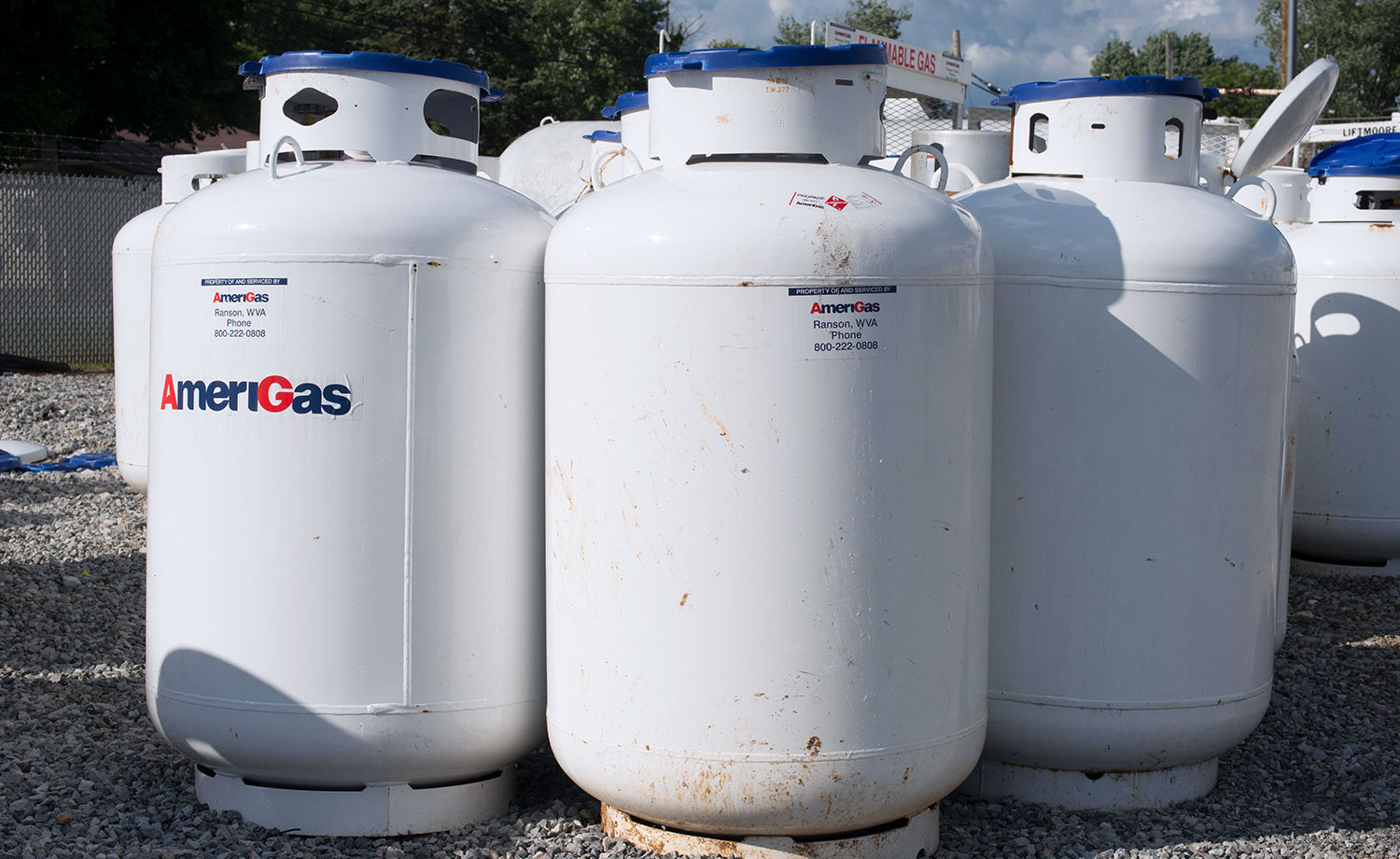Disclosure: This post contains affiliate links and I will be compensated if you make a purchase after clicking through my links. Learn More
A 20-pound propane tank is suitable for small generators, while a 100-pound tank is ideal for larger ones. Choosing the right propane tank size for your generator ensures efficient operation and fuel availability.
Small generators usually work well with 20-pound propane tanks, offering around 4-5 hours of runtime. Larger generators, which require more fuel, benefit from 100-pound tanks, providing extended power during outages. The correct tank size depends on your generator’s wattage and expected runtime.
Always consider how frequently you’ll need to refuel and the duration of power needs. Properly matching tank size to generator requirements ensures seamless and reliable performance, especially during emergencies. Ensure your generator is compatible with the chosen tank size for safe and efficient use.
Introduction To Propane Tanks
Choosing the right propane tank for your generator is important. It ensures you have enough fuel during an emergency. Propane tanks come in various sizes. Each size has its own benefits and uses. Understanding these sizes helps you make an informed decision.
Why Choose Propane
Propane is a clean-burning fuel. It produces fewer emissions than gasoline. This makes it an eco-friendly choice. Propane is also readily available. You can find it at many local stores and suppliers. It is easy to store and has a long shelf life.
Benefits Of Propane Generators
Propane generators have many advantages. Here are some key benefits:
- Reliability: Propane generators start easily, even in cold weather.
- Efficiency: They run longer on a single tank of fuel.
- Maintenance: Propane burns cleaner, reducing engine wear and tear.
- Cost-Effective: Propane is often cheaper than gasoline.
Read Here: How Does a Propane Generator Work
| Tank Size | Generator Runtime |
|---|---|
| 20 lb | 8-10 hours |
| 100 lb | 40-50 hours |
| 250 gallon | 500-600 hours |

Types Of Propane Tanks
Choosing the right propane tank for your generator can be daunting. There are various types of propane tanks available, each serving different needs. Understanding the differences can help you make an informed decision.
Portable Tanks
Portable propane tanks are perfect for smaller generators. They are easy to move and store. Typically, these tanks come in sizes ranging from 5 to 40 pounds. They are ideal for short-term use or emergencies. Below is a table showing common portable tank sizes and their typical uses.
| Tank Size (lbs) | Typical Use |
|---|---|
| 5 lbs | Camping, small grills |
| 20 lbs | Medium grills, small generators |
| 40 lbs | Large grills, medium generators |
Stationary Tanks
Stationary propane tanks are installed in a fixed location. They are suitable for larger generators and longer-term use. These tanks typically range from 100 to 1000 gallons. They are more challenging to move but provide a more extended supply.
- 100 gallons: Suitable for home backup generators.
- 250 gallons: Best for large homes with multiple appliances.
- 500 gallons: Ideal for commercial use or large properties.
- 1000 gallons: Used for industrial purposes.
Knowing the types of propane tanks helps you choose the best one for your generator. Always consider your power needs and usage duration.
Factors To Consider
Choosing the right size propane tank for your generator can be tricky. Several factors influence this decision. Understanding these factors ensures your generator runs efficiently.
Generator Size
The size of the generator directly impacts the propane tank size. Larger generators consume more fuel. Small generators need smaller tanks. Ensure your tank matches your generator’s output capacity.
Related: How Much Propane Does a 22Kw Generator Use
Power Requirements
Understand your power needs before selecting a propane tank. Calculate the total wattage your generator will supply. Higher wattage means higher fuel consumption. Check your generator’s fuel consumption rate. This information is usually in the user manual.
Usage Duration
Consider how long you will run the generator. Longer durations require more fuel. Calculate how long you need the generator to run. This helps in selecting the right tank size. For example, a 20-pound tank lasts about 5 hours at half load.
Here’s a quick reference table:
| Generator Size | Tank Size | Run Time at Half Load |
|---|---|---|
| Small (1-3 kW) | 20 lbs | 5-6 hours |
| Medium (4-7 kW) | 40 lbs | 8-10 hours |
| Large (8-10 kW) | 100 lbs | 20-24 hours |
Use this table to estimate your needs. This ensures you have enough fuel for emergencies. Always have a spare tank for unexpected situations. Planning ahead prevents power outages.

Read Also: What Size Propane Line for Generator
Calculating Propane Needs
To power your generator efficiently, you need to know your propane needs. This involves understanding fuel consumption rates and estimating runtime. Knowing these will help you choose the right propane tank size.
Fuel Consumption Rates
First, determine your generator’s fuel consumption rate. This is how much propane your generator uses per hour. Check the user manual or the manufacturer’s website for specific details.
Here’s a table with typical fuel consumption rates:
| Generator Size (kW) | Fuel Consumption (gal/hr) |
|---|---|
| 5 kW | 0.5 |
| 10 kW | 1.0 |
| 20 kW | 2.0 |
Estimating Runtime
Next, estimate how long you will run your generator. This helps you figure out how much propane you need.
Follow these steps:
- Determine your daily runtime in hours.
- Multiply the daily runtime by the fuel consumption rate.
- Multiply the result by the number of days you plan to use the generator.
For example, if you run a 10 kW generator for 5 hours a day over 3 days:
- Daily fuel use: 5 hours x 1.0 gal/hr = 5 gallons
- Total fuel use: 5 gallons/day x 3 days = 15 gallons
You will need 15 gallons of propane for this period.
Common Propane Tank Sizes
Choosing the right size propane tank for your generator is crucial. The size of the tank impacts how long your generator can run. Below are some common propane tank sizes, each suited for different needs.
20 Lb Tanks
A 20 lb propane tank is lightweight and portable. It’s ideal for small generators. These tanks hold about 4.7 gallons of propane. They are easy to refill and store. A 20 lb tank can run a small generator for around 8 to 10 hours.
- Capacity: 4.7 gallons
- Weight: 20 lbs
- Run Time: 8-10 hours
Our Pick: Flame King YSN201b 20LB Steel Propane Tank
100 Lb Tanks
A 100 lb propane tank provides more fuel. It’s suitable for medium-sized generators. This tank holds approximately 23.6 gallons of propane. It offers longer run times than the 20 lb tank. A 100 lb tank can power a medium generator for about 1 to 2 days.
- Capacity: 23.6 gallons
- Weight: 100 lbs
- Run Time: 24-48 hours
We Pick: Flame King 100LB (23 Gal) Steel Propane Tank Cylinder with POL Valve and Collar
500 Gallon Tanks
For larger generators, a 500 gallon propane tank is the best choice. This tank holds a massive amount of propane. It can power large generators for extended periods. The 500 gallon tank can run a large generator for weeks or even months.
| Capacity | Weight | Run Time |
|---|---|---|
| 500 gallons | Varies | Weeks to Months |
Installation And Safety Tips
Choosing the right propane tank for your generator is crucial. Proper installation and safety are key to ensuring efficient operation. This section will guide you on how to install your propane tank and keep it safe.
Proper Installation
Installing a propane tank properly is essential for safe usage. Follow these steps:
- Choose a suitable location: Place the tank outdoors, away from windows and doors.
- Ensure proper ventilation: The area should have good air flow to prevent gas buildup.
- Stabilize the tank: Use a solid, level base to keep the tank steady.
- Connect to the generator: Use approved hoses and fittings to link the tank to your generator.
- Check for leaks: Apply soapy water to connections and look for bubbles.
Safety Precautions
Safety is paramount when using a propane tank. Here are some tips:
- Regular inspections: Check the tank and connections for damage or wear.
- Proper storage: Store extra tanks in a cool, dry place, away from direct sunlight.
- Emergency plan: Have a fire extinguisher and a plan for gas leaks.
- Follow regulations: Adhere to local codes and guidelines for propane tank usage.
- Use protective gear: Wear gloves and safety glasses when handling the tank.
By following these installation and safety tips, you can ensure your propane tank operates safely and efficiently. Always prioritize safety and proper setup to avoid accidents.
Cost Considerations
Choosing the right size propane tank for your generator involves various cost considerations. These factors impact both the initial and ongoing expenses. Understanding these costs helps you make an informed decision.
Initial Investment
The initial investment in a propane tank depends on its size. Larger tanks cost more upfront. Smaller tanks have a lower initial cost. Here’s a quick comparison:
| Tank Size (Gallons) | Approximate Cost |
|---|---|
| 20 | $50 – $70 |
| 100 | $400 – $500 |
| 500 | $1,500 – $2,000 |
| 1000 | $2,500 – $3,000 |
Refill And Maintenance Costs
Refill costs depend on propane prices and tank size. Larger tanks need fewer refills, reducing frequency and delivery fees. Small tanks need more frequent refills.
- 20-gallon tank: $15 – $20 per refill
- 100-gallon tank: $100 – $150 per refill
- 500-gallon tank: $500 – $750 per refill
- 1000-gallon tank: $1,000 – $1,500 per refill
Maintenance costs include inspections, valve replacements, and potential repairs. Larger tanks might have higher maintenance costs. Regular inspections ensure safe operation. Here’s a quick overview:
- Inspection: $50 – $75 annually
- Valve replacement: $20 – $50
- Repairs: Costs vary based on the issue
Understanding these costs helps you choose the right propane tank size. The right choice balances initial investment and ongoing expenses.

Frequently Asked Questions
What Size Propane Tank For A 5000-watt Generator?
A 5000-watt generator typically requires a 20-30 lb propane tank for optimal performance and duration.
How Long Will A 100 Lb Propane Tank Last?
A 100 lb propane tank can power a generator for approximately 36 hours, depending on the load.
Can I Use A Small Propane Tank?
Yes, small propane tanks can be used, but they will need frequent refilling.
What Is The Best Propane Tank Size?
A 100 lb tank is ideal for most home generators, providing a good balance of capacity and duration.
Final Thoughts
Choosing the right propane tank size for your generator is crucial. It ensures efficiency and uninterrupted power. Consider your generator’s power needs and duration of use. A well-sized tank can save you money and hassle. Make an informed choice for a reliable and efficient power solution.








